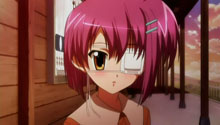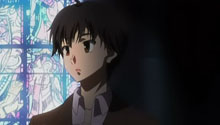ef – a tale of memories – Review
Title: ef – a tale of memories
Episodes: 12
Company: SHAFT
Genre(s): Romance, Drama
Air Dates: 7 Oct 2007 – 23 Dec 2007
Synopsis: Hiro Hirono is a high school student who also works drawing manga. Unfortunately, in doing so, he’s had to skip out on school quite a bit to meet the deadlines. Enter Kei Shindo, Hiro’s childhood friend who tries to look out for Hiro’s well-being. However, her hold over Hiro is being challenged by Miyako Miyamura, a free-spirited girl who also has a habit of skipping school. Together, these three form what is essentially the first love triangle of the series.
The second story centers on Renji, a boy in middle school who befriends Chihiro Shindo, Kei’s twin sister and a girl whose eye is blind due to an accident and cannot remember anything that’s occurred more than 13 hours before. In spite of this Renji works hard to see her every day and together, the two start to undertake a project to begin writing a novel. Although Chihiro cannot remember long enough to ensure that the story will run coherently from one page to the next, it’s with the hope that by collaborating with Renji, she will be able to fulfill her dream of becoming a novelist.
Pros:
- Extremely good use of camera work
- Tenmon once again delivers a good soundtrack along with the OP and ED themes
- Excellent use of symbolism throughout the series
Cons:
- Use of cliches is somewhat annoying
- Some of the characters are difficult to like
Review: Melodrama makes for poor writing because the situations can feel so contrived and the characters feel unbelievable. Thankfully, ef – a Tale of Memories manages to avoid most of the pitfalls of the romance genre through their mix of interesting characters and the situations that they must deal with. Furthermore, ef would not have been so good if it weren’t for the camera work and screen effects which do an excellent job of complementing the characters, giving us an insight into their mindset or an in-depth look into their psyche.
Ef’s approach by using parallel storylines means that at least one of the plotlines should be appealing to the viewer. Hiro’s story follows the typical love triangle plot where Kei and Miyako vie for his attentions and he must choose between the two while Chihiro’s and Renji’s is more of a simple love story with a huge obstacle placed in their path that could destroy their relationship outright.
Hiro’s story is fairly standard in that conflict is sown once Kei and Miyako are aware of one another. Throughout this struggle, neither Kei nor Miyako are presented sympathetically because of the emotional baggage that they bring with them. In spite of this, they are given a lot of background information, allowing the viewer to get a feel for why they act the way they do. However, do not expect much in the way of character development; most of them don’t experience a major change in character or personality until one is forced to accept Hiro’s decision.
Much of the Hiro’s arc’s strength comes from the dialogue regarding theoretical ideas like a discussion over the commercialization of art versus staying true to one’s own vision. It’s those kinds of conversations that succeed in engaging the viewer by presenting a thought-provoking idea and giving the viewer an opportunity to spin those ideas around while listening to the characters’ arguments.
Chihiro and Renji’s story is the stronger of the two because of the way it presents amnesia as an obstacle. The reason why it’s so compelling is because the romance takes place not only through the two interacting with each other, but also through the book that the two decide to write together. Not only does an amnesiac writing a book make for an interesting situation, the symbolism and the parallels it draws between the main character in the novel and Chihiro’s life is excellently executed, especially when it forces Chihiro to make a fateful decision towards the end.
The poignancy of the stories is enhanced through the excellent use of the camera and quirky visuals. Director Shin Ounuma follows in Akiyuki Shinbo’s footsteps by using similar methods that accentuate the mood in a given scene and give us a picture of a certain character’s mindset by complementing their monologue with the visuals. In doing so, we have a more wholesome grasp for the character with all of their frailties and emotional issues.
In spite of all these positives, ef still doesn’t break away from the major clichés that are par for the genre. For a series that had excellent, original storytelling, the moments in which they resorted to clichés really stood out. Thankfully, those moments are few and far in between and did not impair my enjoyment of the series.
Through all of the symbolism that the writers employ and the excellent camera work, ef shows that it can competently present two stories while keeping it interesting and enjoyable. The few minor complaints here and there do not change the fact that ef – A Tale of Memories is a beautiful and compelling drama.
Score: Good





Pingback:ef ~ a tale of melodies - Second verse, better than the first - Gamingforce Interactive Forums